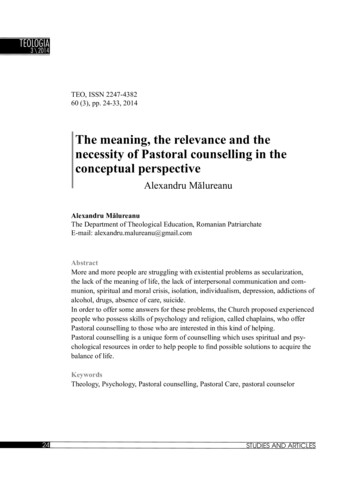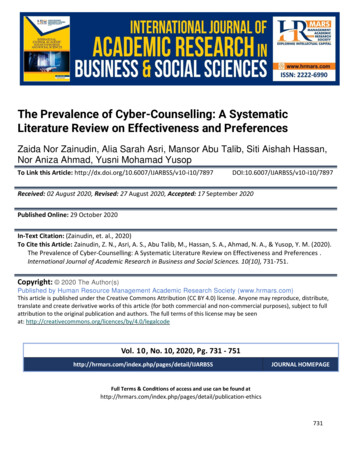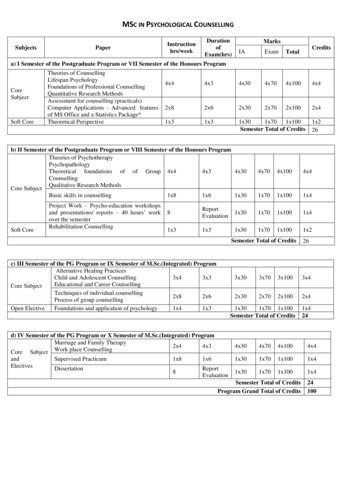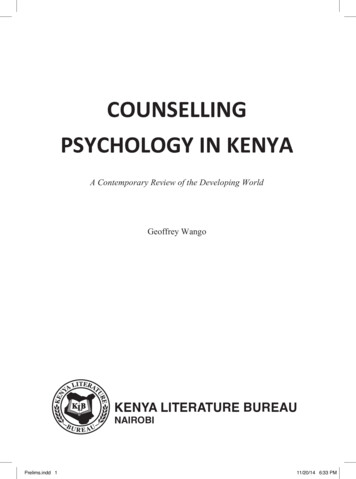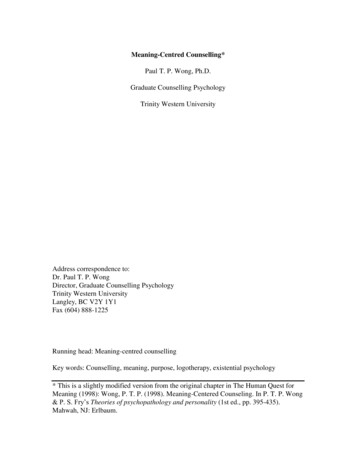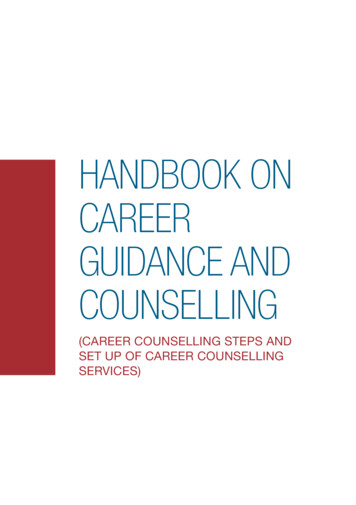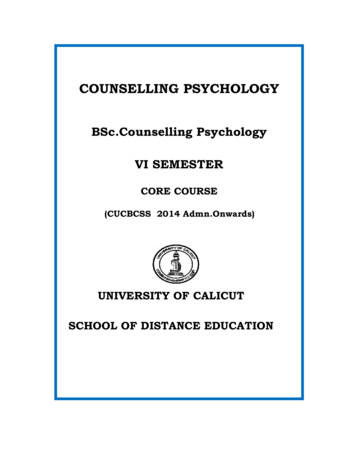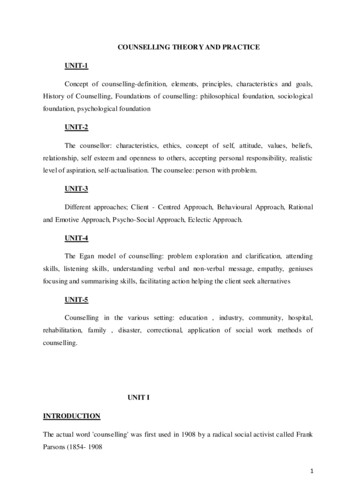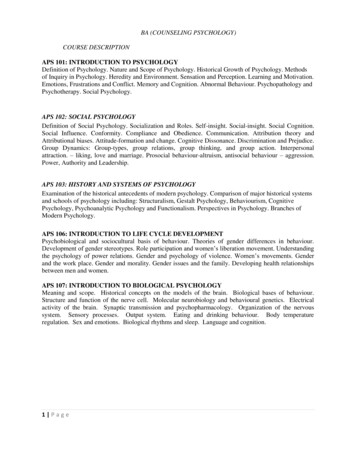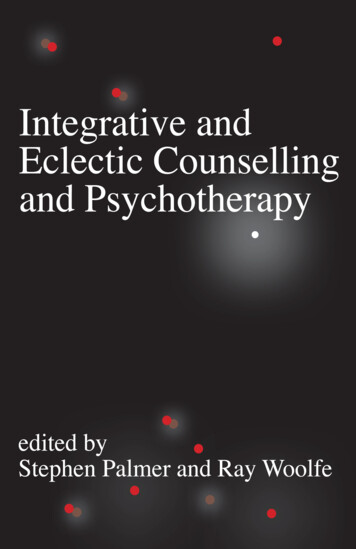
Transcription
INTEGRATIVE AND ECLECTICCOUNSELLING ANDPSYCHOTHERAPY
INTEGRATIVE AND ECLECTICCOUNSELLING ANDPSYCHOTHERAPYEdited byStephen Palmer and Ray Woolfe(S)SAGELos Angeles 1 London New DelhiSingapore Washington DC
Editorial arrangement Stephen Palmer and Ray Woolfe 200Chapter 1 Henry Hollanders 2000Chapter 2 Henry Hollanders 2000Chapter 3 Jane Martin and Frank Margison 2000Chapter 4 David Bott 2000Chapter 5 Katherine Murphy and Maria Gilbert 2000Chapter 6 Stephen Paul and Geoff Pelham 2000Chapter 7 Clare Austin 2000Chapter 8 Stephen Palmer 2000Chapter 9 Peter Jenkins 2000Chapter 10 Stephen Palmer and Michael Neenan 2000Chapter 11 David Crossley and Mark Stowell-Smith 2000Chapter 12 William West 2000Chapter 13 Colin Lago and Roy Moodley 2000Chapter 14 Jenifer Elton Wilson 2000Chapter 15 Val Wosket 2000Chapter 16 Mary Connor 2000Chapter 17 Petruska Clarkson 2000Chapter 18 Ian Horton 2000Chapter 19 Rhona Fear and Ray Woolfe 2000Appendix Ian Horton 2000First published 200Reprinted 2005, 2006, 2007 (twice), 2009, 2012, 2013Apart from any fair dealing for the purposes of research or private study,or criticism or review, as permitted under the Copyright, Designs andPatents Act, 1988, this publication may be reproduced, stored ortransmitted in any form, or by any means, only with the prior permissionin writing of the publishers, or in the case of reprographic reproduction,in accordance with the terms of licences issued by the CopyrightLicensing Agency. Inquiries concerning reproduction outside thoseterms should be sent to the publishers.SAGE Publications Ltd1 Oliver's Yard55 City RoadLondon EC 1Y 1SPSAGE Publications India Pvt LtdB 1 /I 1, Mohan Cooperative Industrial AreaMathura RoadNew Delhi 110 044SAGE Publications Inc.2455 Teller RoadThousand Oaks, California 91320SAGE Publications Asia-Pacific Pte Ltd3 Church Street#10-04 Samsung HubSingapore 049483British Library Cataloguing in Publication dataA catalogue record for this book is available from the British LibraryISBN 978-0-7619-5798-0ISBN 978-0-7619-5799-7 (pbk)Library of Congress catalog card number available from the publisherTypeset by M RulesPrinted in Great Britain by the MPG Books GroupY3MIXV'lfV Paper fromresponsible sourcesESS;FSC COISSTS
To my wife, Sarah (RW)To those who influenced my childhood, in particular, my parents,grandparents, Sylvie, Frank, Norah, Bob, Fred, Eileen, Sue and Reg (SP)
CONTENTSThe EditorsixNotes on ContributorsxiPrefacePARTI INTRODUCTION1 Eclecticism/Integration: Historical DevelopmentsHenry Hollanders2 Eclecticism/Integration: Some Key Issues and ResearchHenry HollandersPART II THERAPEUTIC APPROACHES3 The Conversational ModelJane Martin and Frank Margisonxv113157574 Integrating Systemic Thinking in Counselling andPsychotherapyDavid Bott745 A Systematic Integrative Relational Model for Counsellingand PsychotherapyKatherine Murphy and Maria Gilbert936 A Relational Approach to TherapyStephen Paul and Geoff Pelham1107 Integrated Eclecticism: A Therapeutic SynthesisClare Austen1278 Multimodal TherapyStephen Palmer1419 Gerard Egan's Skilled Helper ModelPeter Jenkins16310 Problem-Focused Counselling and PsychotherapyStephen Palmer and Michael Neenan181
viiiINTEGRATIVE AND ECLECTIC COUNSELLING AND PSYCHOTHERAPY11 Cognitive Analytic TherapyDavid Crossley and Mark Stowell-Smith20212 Eclecticism and Integration in Humanistic TherapyWilliam West218PART III233ISSUES13 Multicultural Issues in Eclectic and Integra tive Counsellingand PsychotherapyColin Lago and Roy Moodley23314 Integration and Eclecticism in Brief/Time-Focused TherapyJenifer Elton Wilson25215 Integration and Eclecticism in SupervisionVal Wosket27116 Integration and Eclecticism in Counselling TrainingMary Connor29117 Eclectic, Integra tive and Integrating Psychotherapy orBeyond SchoolismPetruska Clarkson18 Principles and Practice of a Personal IntegrationIan Horton19 The Personal, The Professional and The Basis of Integra tivePracticeRhona Fear and Ray WoolfeAppendix. Exercise: Developing a Personal IntegrationIan HortonIndex305315329341345
THE EDITORSProfessor Stephen Palmer PhD is a chartered psychologist (counsellingand health), a UKCP registered cognitive-behavioural psychotherapist anda certified REBT supervisor. He is Director of the Centre for StressManagement and the Centre for Multimodal Therapy in London, anHonorary Visiting Professor at the Centre for Health and CounsellingPsychology, City University, and Honorary Senior Research Fellow at theUniversity of Manchester. He is a Fellow of the British Association forCounselling and the International Stress Management Association. He iscurrently President of the Institute of Health Promotion and Educationand Honorary Vice-President of the International Stress ManagementAssociation (UK). He has written and edited sixteen books includingIntegrative Stress Counselling (with Milner, Cassell) and the Handbook ofCounselling (with McMahon, Routledge) and edits three book series including Brief Therapies (Sage).Ray Woolfe took early retirement in 1997 from his post as Senior Lecturerin Counselling Studies at Keele University and now works in private practice as a chartered counselling psychologist offering therapy, supervisionand training. He is currently in advanced training as a psychodynamicpsychotherapist. He has contributed widely to the literature on counsellingand his publications include the Handbook of Counselling Psychology, themajor textbook on counselling psychology in the UK. He is activelyinvolved within the British Psychological Society with the accreditationboth of individuals and of courses and is a Fellow of the British Associationfor Counselling. He is a Strategic Director for the Professional Development Foundation, London.
NOTES ON CONTRIBUTORSClare Austen is a Chartered Counselling Psychologist. A former lecturer incounselling with a background in adult mental health and child and familypsychiatry, she now divides her time between working in primary care andprivate practice.David Bott is a Senior Lecturer in Counselling and Therapy at the Universityof Brighton. He is a UKCP registered systemic psychotherapist and a BACaccredited counsellor, practising independently and working with individuals, couples and families. His publications include a number of paperswhich address the relationship between theories and models of counsellingand psychotherapyProfessor Dr Petruska Clarkson, PHYSIS and Surrey University, FBAC,FBPS, CPsychol, UKCP registered Psychotherapist and accreditedSupervisor with almost 30 years' international experience, over 150 publications, the original designer of the first UK MSc level IntegrativePsychotherapy course, first Chair of the British Institute for IntegrativePsychotherapy. Author of The Therapeutic Relationship and Ethics: Workingwith Ethical and Moral Dilemmas in Psychotherapy.Dr Mary Connor is Head of Individual and Organisation DevelopmentStudies at the University College of Ripon and York St John and she is alsoan Honorary Fellow of the University of York, She has developed an integrative model (Training the Counsellor, Routledge, 1994) which encapsulatesher experience of 20 years as a counsellor trainer.David Crossley's first degree is in theology and religious studies beforequalifying in medicine. He trained first as a GP and subsequently in psychiatry and psychotherapy and has several publications in the field ofpsychiatry. He also has worked as a teacher and medical officer in Africa.Currently he is Senior Registrar in Psychotherapy in Liverpool.Jenifer Elton Wilson is a Chartered Counselling Psychologist andUKCP Registered Psychotherapist. In 1996, Jenifer published a book onthe subject of Time-Conscious Psychological Therapy: A Life Stage to goThrough. She has, for several years, taught Masters Courses in Integrative
xiiINTEGRATIVE AND ECLECTIC COUNSELLING AND PSYCHOTHERAPYPsychotherapy and Counselling. Previously, she was the first Chair of theBPS Division of Counselling Psychology and is at present Chair of theTraining Committee of that division. She established an expanded counselling and psychological service at the University of the West of England,Bristol. She retired from UWE in September 1997 and immediately tookup the post of Head of the Doctoral Department at Metanoia. She is in private practice as a therapist, a clinical supervisor, a consultant and afreelance trainer.Rhona Fear MA is a counsellor in private practice in Worcestershire. Herinterest in the relationship between counsellors' choice of theoretical orientation and their underlying personal philosophy developed as aconsequence of an interest in the integration debate and her search for apersonal integrative approach. She is the author of a number of papers onthese subjects.Maria C. Gilbert MA, CPsychol, UKCP registered integrative psychotherapist is currently the Head of the Integrative Psychotherapy Training andSupervision Training at the Metanoia Institute in West London. She has aprivate practice as a clinician, consultant and supervisor and has recentlyco-authored Brief Therapy with Couples: An Integrative Approach.Dr Henry E. Hollanders has had many years experience in the field ofcounselling, having worked in pastoral, community, medical and educational settings. He is currently a lecturer at the University of Manchester,where he directs the Masters in Counselling programme (MA inCounselling Studies). His counselling practice is based at Pendle inLancashire and the city of Manchester.Ian Horton is a Principal Lecturer and Course Director of the IntegrativeDiploma/MA in Therapeutic Counselling /Psychotherapy at the Universityof East London (Psychology Department). He is a BAC accredited practitioner, Chair of UK Register of Counsellors and a Fellow of BAC.Peter Jenkins is Senior Lecturer in Counselling Studies at the University ofCentral Lancashire. He is the author of Counselling, Psychotherapy and theLaw (Sage, 1997) and co-author, with Debbie Daniels, of Therapy withChildren (Sage, in press).Colin Lago is the Director of Counselling Service at Sheffield University.He has long been interested in and concerned about enhancing the effectiveness and provision of transcultural counselling and has authoredseveral books including Race, Culture and Counselling (O.U. Press, 1996). Heis a Fellow and Accredited Member of BAC.
NOTES ON CONTRIBUTORSXlllDr Frank Margison MB ChB, MD, FRCPsych has been a ConsultantPsychiatrist in Psychotherapy at Gaskell House Psychotherapy Service inManchester since 1983. He has been involved in training and research inthe Conversational Model for 20 years and before that worked on themother-baby relationship during psychiatric illness.Dr Jane Martin BA, Cert. Ed, MB ChB, MRCPsych is a Specialist Registrar inPsychotherapy at Gaskell House Psychotherapy Service in Manchester. Aftergaining a degree in modern languages she worked as a teacher, lecturer andcollege counsellor, before deciding to study medicine in her thirties. Sheplans to become a Consultant Psychiatrist in Psychotherapy in the NHS.Roy Moodley is currently a freelance trainer in multicultural psychotherapy and counselling. He was Assistant Director for Research andDevelopment at Thomas Danby College, Leeds and is now completing aPhD in psychotherapy at the University of Sheffield. He has publishedpapers on race, counselling and psychotherapy; masculinity and management; access to HE.Katherine Murphy MSc (psychotherapy) is a UKCP registered integrative psychotherapist. She is involved both in clinical practice and theeducation of psychotherapists and workbased counsellors, and has a passionate interest in what constitutes appropriate preparation for the practiceof the art and craft of therapeutic endeavours.Michael Neenan is Associate Director of the Centre for Stress Managementin Hayes, Kent. He is an accredited therapist in cognitive-behaviour therapy (CBT) and rational emotive behaviour therapy (REBT) and is co-chairof the Association of REB therapists. He is on the editorial boards ofCounselling, the journal of the British Association of Counselling and StressNews, the journal of the International Stress Management Association (UK).He has co-authored six books on REBT.Stephen Paul is trained in counselling and psychotherapy. He is PrincipalLecturer in Psychology and Programme Leader for Counselling andPsychotherapy courses at Leeds Metropolitan University. His therapeuticwork includes seven years in Child and Adolescent Psychiatry, a Headshipof a Special School for children and young people with emotional andbehavioural problems and almost 20 years of therapy with adults in a variety of settings.Geoff Pelham PhD is Course Leader of the Therapeutic CounsellingProgramme based at Leeds Metropolitan University and Park LaneCollege. The Relational Approach is the core model on the Diploma whichis BAC accredited. He is a BAC accredited counsellor and trainer. He alsoworks as a therapist and supervisor in private practice.
xivINTEGRATIVE AND ECLECTIC COUNSELLING AND PSYCHOTHERAPYMark Stowell-Smith works as a Psychotherapist in the St Helens andKnowsley Hospital Trust. His first degree is in history and philosophyand he has completed subsequent degrees in psychology. He originallytrained as a Psychiatric Social Worker and worked in the forensic field. Hehas published work in this area and retains an interest in the application ofpsychotherapeutic approaches to forensic issues.William West is a full-time lecturer in Counselling Studies at ManchesterUniversity where he teaches on the Advanced Diploma, MA and PhD programmes. He has an MA and PhD in Counselling Studies from KeeleUniversity and maintains a small private practice. His current researchand writing interests include therapy and spirituality, integrative medicineand supervision. He is a member of the BAC research and evaluation subcommittee.Val Wosket is Head of Scheme for Counselling Studies at the UniversityCollege of Ripon and York St John, where she is Course Director for theGraduate Diploma in Counselling and the Certificate /Diploma inCounsellor Supervision. She is an accredited counsellor (BAC), author ofThe Therapeutic Use of Self: Counselling Practice, Research and Supervision(Routledge, 1999) and co-author of Supervising the Counsellor: A CyclicalModel (with Steve Page, Routledge, 1994).
PREFACEA term now in regular use to describe the zeitgest or spirit of our age is'post-modernist'. The essence of post-modernism is a decline in the beliefof purist approaches to understanding physical, biological and social phenomena. This has permeated the whole field of human endeavour indisciplines as wide ranging as medicine, chemistry, architecture, art andpolitics. In the latter field, for example, the traditional boundaries betweenleft and right have been largely obscured. Where once there was a belief inpurist solutions, now there is only doubt and a resort to a more flexible andpragmatic approach to understanding the world in which we live.Counselling and psychotherapy are not immune from this tendency. Adomain which has always been prone to doctrinal differences and separatist tendencies is now increasingly coming to accept that there is littleevidence that any one therapeutic method is superior to all others for alltypes of problems and all types of clients or patients. This has led to agrowing interest in flexibility of response and bringing together ideas fromdisparate schools. The terms integrative and eclectic have come to be usedincreasingly to describe this process.This development has been reflected in the appearance of a number ofmajor American texts and accompanied by a growing British literature onthe subject, in addition to the establishment first of an International Societyfor the Exploration of Psychotherapy Integration and its British branch, theBritish Institute of Integrative Psychotherapy.Inherent within these developments is the idea that change is a constantly occurring process. Thus the accounts in this book are to beunderstood as a statement of the field at the present time. Some of theapproaches discussed are now well established and likely to be around forthe forseeable future, while others are still in an active phase of development. This diversity reflects the nature of the field.The chapters are divided into three parts. Part I, Introduction, offers adetailed account of the history and origins of the growth of integration andeclecticism. This incorporates an extensive review of both the British andAmerican literature and traces the development of a variety of the keymodels. The key issues in the eclectic/integrative approach are introducedand discussed.Part II, Therapeutic Approaches, offers detailed discussion of someof the key therapies encompassed within the subject of integration/
xviINTEGRATIVE AND ECLECTIC COUNSELLING AND PSYCHOTHERAPYeclecticism. Inevitably, the choice is selective. It is not possible to includeevery approach. Nevertheless we think that the section incorporates arange of approaches from those which are well established to others whichare still struggling towards greater institutional support. We leave it to thereader to decide which approach falls into which category.In Part II the authors were asked to do the following: Discuss the origins of the approach, who developed the theory, whenand where. Describe the major central concepts and if these derived from morethan one tradition, how these are reconciled. Explain the basic assumptions about human nature and individualdevelopment. Explain how psychological disturbance is acquired and perpetuatedand how the individual may move from psychological disturbance topsychological health. Identify the goal of the therapeutic method. Describe how the theory is related to the practice, including a discussion of the change process and the therapeutic relationship. Describe the format of a typical session. Give some account of indications and contraindications of who wouldfind the approach helpful or unhelpful and the type of problems whichare most amenable to being treated by the approach. Offer a case study describing the application of the approach in practice. Look at wider implications in relation to the range of settings andmodalities in which the approach can be used. Speculate on future developments.In Part III, Issues, there are chapters focusing on training, supervisionand multicultural issues, in addition to discussions on what integrationmight mean at a more individual level.Our hope is that the book will offer a comprehensive account of what ismeant by integration /eclecticism, explain the key issues and ideas anddemonstrate how they are represented in practice in the UK.
l developmentsHenry HollandersIn this chapter the historical developments of the movement towards eclecticism and integration in the field of counselling/psychotherapy will betraced from 1930 through to the first half of the 1990s. Publications relatingto eclecticism /integration will be referred to and those that seem to havehad some significant effect on the movement will be briefly reviewed. Themain events in the development of the movement, and the work of some ofthe influential figures, will all be highlighted. Some more specific issuesrelated to eclecticism and integration, together with an overview ofresearch, will be dealt with in the next chapter.Setting the sceneWhile psychotherapy as a discrete discipline has a relatively short historyof little more than one hundred years (Freedheim, 1992), the role of thepsychotherapist reaches back across the ages to the earliest days of humanexistence (Ehrenwald, 1976). In this more general, non-specific sense thehistory of counselling and psychotherapy is interwoven with the history ofthe way in which human beings have managed, and have been managedby, the psyche. Its central concern can be considered to be the makingwhole of the inner being or soul (Bettelheim, 1983), and as such the historyof psychotherapy is the history of that age-old endeavour.In the much narrower sense of a movement or discipline, psychotherapy has a short history. In a preface to the most comprehensive recent
2INTEGRATWE AND ECLECTIC COUNSELLING AND PSYCHOTHERAPYhistory of psychotherapy (from a mainly American perspective),Freedheim (1992) refers to the facts that many of the chapters making upthe book cover aspects of psychotherapy that are less than fifty years oldand that they are written by living authors who are themselves amongthe originators of the systems about which they are writing. Thus 'theperspective of time, which can be helpful in assessing historical influences, is non-existent for many of the topics covered' (Freedheim, 1992:xxviii). Nevertheless, in spite of psychotherapy7 s comparatively shortlife, a great complexity of ideas, approaches and movements has developed, which has inevitably been influenced and shaped by the social,economic, political and cultural climates in which it has been formed(Buss, 1975; Cushman, 1990; VandenBos et al, 1992; Pilgrim, 1997). It isonly in the context of these other 'histories' that the history of psychotherapy can be properly presented. Such a task, however, is waybeyond the scope of this review, which has as its more modest aim theprovision of an outline of the developments of just one strand in thiscomplex tapestry - the even more recent movement towards integrationin psychotherapy and counselling.Early history: schools and segregationThe early history of psychotherapy and counselling is dominated by thedevelopment of different schools, each one eager to present its caseagainst the others and each with its own language, which only those committed to its ideas would be likely to understand. The resulting cacophonyhas been likened by Messer (1987) to the Tower of Babel. A separatist,denominational spirit prevailed in which theory, mainly in the form ofdogmatics and lacking any substantial research base, was propoundedwithin an adversarial culture, characterized by Larson (1980) as 'dogmaeat dogma'. Perls's (1969) unedifying description of psychoanalysis as'crap' and the more sophisticated but no less vitriolic attacks on psychoanalysis by prominent behaviourists (e.g. Eysenck, 1960; Wolpe andRachman, 1960) serve as examples of the ethos of this period. In assigningsuch attitudes to an earlier period, however, it is not intended to implythat the field is currently beyond them. Disputes between orientationsremain, which even now may take the form of ridicule rather than reasoned debate, as evidenced by Clarke's caricature of the work of Ellis(Clarke, 1990).Kuhn's (1970) description of a discipline prior to the development of ashared paradigm, which gives definition to the field and around which anidentifiable community is built, offers a remarkably accurate picture ofthis period.
HISTORICAL DEVELOPMENTS3The early development of eclectic attitudes: the movementtowards desegregation 1930-1960Even within the adversarial climate described above, another attitudinalstrand can be traced. A body of therapists working at grass-roots levelwas beginning to recognize elements in approaches other than their ownthat needed to be heard. This diverse and ill-defined group has beentermed a 'therapeutic underground' (Goldfried and Davison, 1976;Wachtel, 1977) to which belonged all who, while outwardly and publiclyespousing a single orientation, were prepared, in the privacy of their ownstudy and practice, to open themselves to influences from otherapproaches.There is no way of knowing the numbers involved but evidence for theexistence of such a group is drawn from the way in which, every now andthen, a plea to colleagues to consider the possibilities of rapprochementand even integration would be made first by one and then another. Voiceswere raised intermittently, and at first were generally unheeded, but theywere there. As early as 1932 a voice sounding an eclectic/integrative notewas raised by French (1933) in an address delivered to a meeting of theAmerican Psychiatric Association. It was an attempt to persuade colleagues of the similarities he considered to exist between two seeminglyincompatible sets of concepts, namely Freudian psychoanalysis andPavlovian conditioning. The address was published in the following yeartogether with some of the reactions, some sympathetic but mostly hostile,to this attempt at rapprochement. Essentially French was seeking to translate the concepts of one orientation into the language of the other. Giventhat Pavlov acknowledged the possibility of associations existing outsideof awareness (Pavlov, 1927), it seemed not an unreasonable task to attemptby someone with goodwill towards another way of 'seeing'. Few had thesame goodwill, however, and though Kubie (1934) continued the task inthe following year, and Shoben (1949) took it up again some time later, byfar the greatest efforts of the theorists of this time were devoted to establishing and developing their own orientations as 'superior' systems.Nevertheless, French had begun what was later to become a major focusfor those concerned to bring the orientations closer together, namely theintegration of psychoanalysis with behaviourism.Another attempt at rapprochement, and from a different perspective tothat of French, was made by Rosenzweig in 1936. This could bedescribed as a basic common factors approach, with Rosenzweig pointing to some commonalities across orientations. He focused on theimportance of the personality of the therapist, whatever his theoreticalorientation, and on the usefulness of any kind of intervention, behavioural or dynamic, that contributed to a new perspective on the problem.The point of entry into the dysfunctional system, whether it be at thepoint of problematic behaviour or of emotional distress arising out ofinternal conflict, is not of primary importance since change in any one
4INTEGRATIVE AND ECLECTIC COUNSELLING AND PSYCHOTHERAPYaspect of human functioning is bound to exert a synergistic influence onall other aspects.The 'common factors' theme emerged again four years later at a meetingof a group of psychotherapists held informally during a conference of theAmerican Orthopsychiatric Association. As described by Watson (1940)this meeting was for the purpose of exploring the therapeutic factors thatthe members held in common with each other. Following the discussionWatson drew the conclusion that agreement between them was 'greater inpractice than in theory' (p. 708). This seems to imply that what was later tobe described as 'technical eclecticism' was already in operation at somelevel by this time.In 1950 Fiedler (1950a, 1950b) published his findings from a study showing that less experienced therapists tended to hold much more tenaciouslyto theoretical allegiances than did their more experienced counterparts,and that experienced therapists from different orientations were closer toeach other than they were to inexperienced colleagues within their ownorientation.In the same year Dollard and Miller (1950) published their widelyacclaimed Personality and Psychotherapy. This work has an enduring qualityand is still in print. To some extent it informed the latter work of Wachtelin this area and deserves some more detailed attention here./. Dollard and N.E. Miller Personality and Psychotherapy, AnAnalysis in Terms of Learning, Thinking and Culture (2950)p i i s work represents a major attempt at bringing together concepts frompsychoanalysis and behavioural theory, and thus continues the task begun17 years earlier by French. It goes beyond French, however, in that it ismore than an attempt at translation; rather it seeks to demonstrate thepossibility of an integration of a number of concepts from these twodiverse orientations. In particular it focuses on the learned nature of theneuroses, involving the learning of repression, unconscious conflicts andsymptoms. Therapy involves new learning which can take place under certain conditions and includes a proper selection of patients who are able tolearn, the use of free association, transference, labelling (in the sense ofteaching patients to think about new topics), teaching discriminationbetween the roles of the past and of the present, and a concentration on thegains that can be obtained from the restoration of the 'higher mentalprocesses'. Though the therapeutic process, as Dollard and Miller describeit, remains largely psychoanalytic, the therapist is seen as 'a special kind ofteacher' and some behavioural procedures are introduced, particularly theuse of homework assignments and techniques for the reinforcement ofdesired behaviours.Dollard and Miller's project was funded by the Institute of HumanRelations at the University of Yale and, although the book was publishedin 1950, work on it had begun before the involvement of the USA in World
HISTORICAL DEVELOPMENTS5War II. Originally it took the form of lectures to classes and discussionswith colleagues. Since this implies an early interest among a wider groupof people than just the two authors heading the project, it supplies furthersupport for the existence of an 'underground' group of therapists prepared to reach across orientational boundaries at a time when conflictbetween the orientations was rife.Gathering momentum: the eclectic movement in the 1960s and1970sThe 1960s: the 'underground' begins to emergeMomentum in the movement towards the desegregation of the orientations, began to grow in the 1960s. 'Schoolism' was still rife, but even so asurprising number of practitioners were prepared to identify themselves aseclectic when surveyed (see Chapter 2). Clearly, there was a realizationamong many that the segregation of the therapies was both unhelpful andunrealistic. The increasing volume of psychotherapeutic literature meantthat a reservoir of therap
tice as a chartered counselling psychologist offering therapy, supervision and training. He is currently in advanced training as a psychodynamic psychotherapist. He has contributed widely to the literature on counselling and his publications includ Handbooke the of Counselling Psychology, the major textbook on counselling psychology in the UK.
